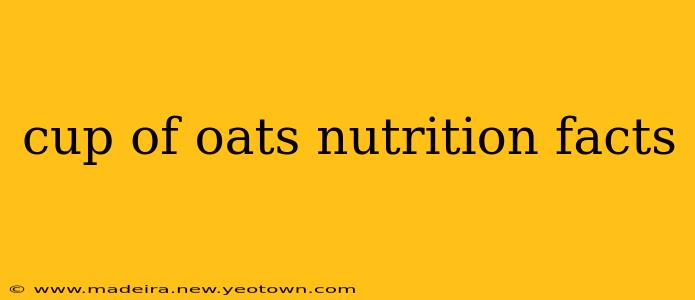Oats. Just the word conjures images of hearty breakfasts, comforting porridge, and a wholesome start to the day. But beyond their delicious simplicity lies a nutritional powerhouse packed with benefits for your health and well-being. Let's explore the nutritional facts behind that seemingly humble cup of oats, uncovering why they deserve a prominent place in your diet.
What are the nutritional benefits of a cup of oats?
A single cup of dry rolled oats (approximately 1.5 cups cooked) is a nutritional goldmine. It’s a significant source of complex carbohydrates, providing sustained energy throughout the morning without the blood sugar crash often associated with refined carbohydrates. Beyond energy, oats are brimming with fiber, both soluble and insoluble, crucial for digestive health. Soluble fiber, in particular, helps lower cholesterol levels, contributing to heart health. And let's not forget the vitamins and minerals – oats are a good source of magnesium, manganese, and several B vitamins, all vital for various bodily functions.
How many calories are in a cup of oats?
The caloric content of a cup of oats varies slightly depending on the type of oat (rolled, steel-cut, instant) and preparation method. Generally, a cup of dry rolled oats contains around 300-350 calories. However, adding milk, sugar, fruits, or nuts will significantly increase the calorie count. Remember, calorie needs are individual, and this should be considered within your overall daily intake.
What type of oats are the healthiest?
This is a question frequently debated among health enthusiasts! The truth is, all types of oats offer nutritional benefits. However, steel-cut oats often win the "healthiest" title due to their minimally processed nature and higher fiber content. They take longer to cook, but the added nutritional value and sustained energy release are worth the wait for many. Rolled oats (also known as old-fashioned oats) are a close second, offering a good balance between nutritional value and ease of preparation. Instant oats are convenient but often contain added sugars and are less nutritious.
Are oats good for weight loss?
The high fiber content in oats contributes to a feeling of fullness and satiety, which can aid in weight management. By keeping you feeling satisfied for longer, oats can help reduce overall calorie intake and prevent unhealthy snacking. However, it's important to remember that oats alone won't magically lead to weight loss. A balanced diet and regular exercise are key components of any successful weight loss plan.
What are the potential downsides of eating too many oats?
While oats offer numerous health benefits, consuming excessive amounts can lead to some potential drawbacks. The high fiber content, while generally beneficial, can cause digestive discomfort like bloating or gas, especially if you're not used to consuming large amounts of fiber. Additionally, individuals with celiac disease or gluten sensitivity should opt for certified gluten-free oats, as even conventionally grown oats can be cross-contaminated with gluten. Moderation is key, as with any food.
Conclusion: Oats – A Daily Staple Worth Celebrating
From providing sustained energy to supporting heart health and aiding digestion, the humble cup of oats offers a wealth of nutritional advantages. By understanding the nutritional profile and selecting the type of oat that best suits your needs and preferences, you can confidently incorporate this versatile grain into your daily diet and reap its numerous health benefits. Remember to choose whole, minimally processed oats whenever possible, and savor the delicious and nutritious experience!

